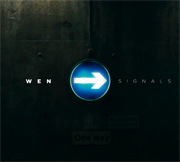Owen Darby, aka Wen, uses his music in a way that – grumpy old fart alert – I wish more artists would these days: with a distinctly political edge. It may not be the overt sloganeering of the flower power generation, or the angry hectoring of punk’s first flourish, but by clearly anchoring his visions of garage and grime within the urban jungle of modern Britain, Darby makes a statement, and it’s one worth picking out of his synths, beats and basslines.
"Big up my family," declares a young MC sampled on the opening intro track, before declaring "This UK is real!" These words, snatches of bars sampled from grime MCs and tracks that have inspired Darby, encapsulate a divide that has been bubbling closer and closer to the surface in modern Britain: the "us and them" narrative, developed into political agenda through Tory policies and the press. People and their families are no longer simply that – they may now potentially be viewed as scroungers costing the taxpayer (even if they’re in work), job-thieving immigrants depriving indigenous Brits, or feral youth waiting on every street corner to rob and assault the righteous. The true existences of people are rendered immaterial by stereotypes. Accordingly, Wen’s music is cold, distant and dispassionate, a fractured vision of a splintered London society. Words emerge from glassy layers of electronics and jerky beats, never present long enough to be identified or clearly interpreted; lost voices appealing to indifferent ears.
Aside from this veiled socio-political context, the austerity (another topical word) of Signals is a sign of the way grime and grime-inspired music has evolved in the decade-and-a-bit since the genre first burst onto the underground club scene and pirate radio. With grime having found its way to the pop charts repeatedly over the years, those artists still attached at root level have continued to strip their music back to its core. The rhythms on Signals are juddering and skeletal, the bass a ghostly half-presence reminiscent of Burial’s phantom dubstep. With the exception of ‘Time’, which features Parris, the song element of MC-led grime is removed altogether in favour of slogan-like one-liners that jerk in and out of songs like scattered graffiti, culminating in the threatening lines of "Your neck should be swinging, bruvva!" belted out on ‘Swingin”, an eruption of violence that feels scarily real in Wen’s reconstructed London. Signals is a mirror vision of Britain’s capital, all wide spaces, ice-cold nocturnal vistas and hints of blaring modernity. Synth sounds conjure up the constant bleeping of smart phones and outdoor advertising, creating a schism between the earthy urban sounds of the people whose voices interject across the album, and the constantly shifting city that surrounds them, or even hems them in.
Signals is a vital, exciting album, precisely because it walks this fine line between aesthetic detachment and the gritty effervescence of a sketched reality. Several of the tracks are inherently danceable, echoing grime’s essence as a dancefloor genre, while others are arch and underlined by a current of moody despondency. Like mid-noughties albums like Burial’s self-titled debut or Wiley’s Playtime Is Over, this is underground electronic music that emphatically and ambiguously conjures up London; and the reflection Wen throws back at the world is harsh, seductive and questioning in equal measure.


